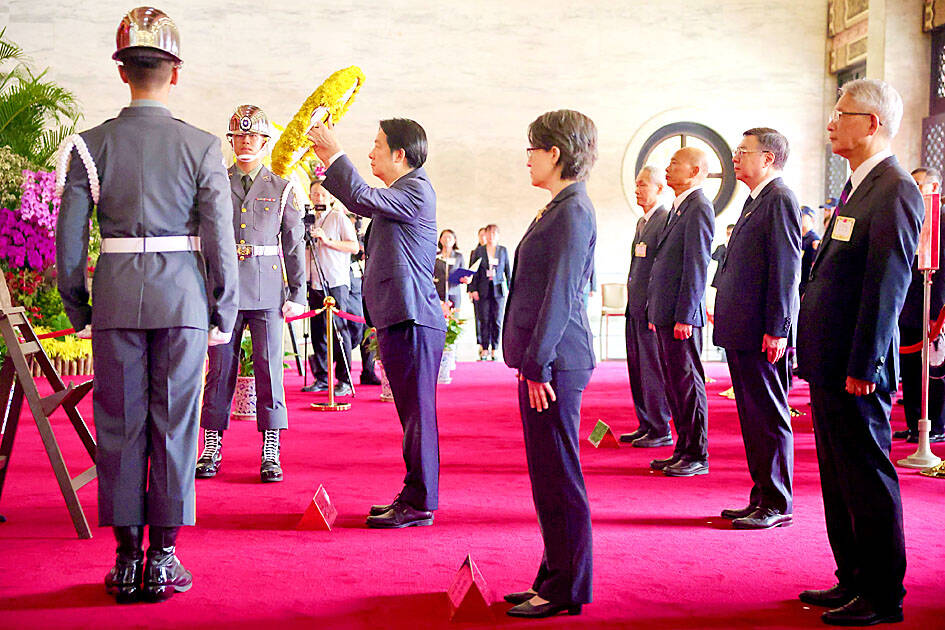Countries should uphold peace, and promote freedom and democracy, President William Lai (賴清德) said yesterday as Taiwan marked 80 years since the end of World War II and the Second Sino-Japanese War.
Lai, Vice President Hsiao Bi-khim (蕭美琴) and other top officials in the morning attended a ceremony at the National Revolutionary Martyrs’ Shrine in Taipei’s Zhongshan District (中山) to honor those who sacrificed their lives in major battles.
“Taiwanese are peace-loving. Taiwan does not believe in commemorating peace by holding guns,” Lai wrote on Facebook afterward, apparently to highlight the contrast with the military parade in Beijing marking the same anniversary.

Photo: CNA
“We remember the martyrs and the lessons of history, and continue to safeguard our beliefs in freedom and democracy,” Lai said. “We believe guns in our hands are to protect our country and home, not to be used for invasion or expansion.”
On Sept. 2, 1945, Republic of China (ROC) general Hsu Yung-chang (徐永昌) signed the Japanese Instrument of Surrender alongside other representatives of Allied nations, bringing WWII to an end, Lai said.
Japan, Germany and Italy have since become democratic countries that uphold human rights and the rule of law, he added.
“I sincerely hope countries that once suffered invasion can work together to safeguard peace, and make freedom and democracy the cornerstones of stability and prosperity,” he said.
Lai also warned against the resurgence of fascism, which he described as characterized by “extreme nationalism,” censorship and leader worship.
The comments were an apparent reference to the official title of the military parade in Beijing: “The 80th Anniversary of the Victory in the War Against Japanese Aggression and the World Anti-fascist War.”
Chinese President Xi Jinping (習近平) presided over the event in Beijing alongside Russian President Vladimir Putin, North Korean leader Kim Jong-un and Iranian President Masoud Pezeshkian among others.
The Second Sino-Japanese War was fought between the ROC, then based in China, and Japan from 1937 to 1945. The conflict is widely regarded as part of World War II.
The ROC government, led by Chiang Kai-shek (蔣介石), relocated to Taiwan in 1949 after losing the Chinese Civil War to Mao Zedong’s (毛澤東) Chinese Communist Party. Mao established the People’s Republic of China in Beijing later that year.
Taipei says that the ROC played the central role in resisting Japan, while Beijing claims credit through commemorative events, including yesterday’s parade.

The US government has signed defense cooperation agreements with Japan and the Philippines to boost the deterrence capabilities of countries in the first island chain, a report by the National Security Bureau (NSB) showed. The main countries on the first island chain include the two nations and Taiwan. The bureau is to present the report at a meeting of the legislature’s Foreign Affairs and National Defense Committee tomorrow. The US military has deployed Typhon missile systems to Japan’s Yamaguchi Prefecture and Zambales province in the Philippines during their joint military exercises. It has also installed NMESIS anti-ship systems in Japan’s Okinawa

TRAGEDY STRIKES TAIPEI: The suspect died after falling off a building after he threw smoke grenades into Taipei Main Station and went on a killing spree in Zhongshan A 27-year-old suspect allegedly threw smoke grenades in Taipei Main Station and then proceeded to Zhongshan MRT Station in a random killing spree that resulted in the death of the suspect and two other civilians, and seven injured, including one in critical condition, as of press time last night. The suspect, identified as a man surnamed Chang Wen (張文), allegedly began the attack at Taipei Main Station, the Taipei Fire Department said, adding that it received a report at 5:24pm that smoke grenades had been thrown in the station. One man in his 50s was rushed to hospital after a cardiac arrest

‘WIN-WIN’: The Philippines, and central and eastern European countries are important potential drone cooperation partners, Minister of Foreign Affairs Lin Chia-lung said Minister of Foreign Affairs Lin Chia-lung (林佳龍) in an interview published yesterday confirmed that there are joint ventures between Taiwan and Poland in the drone industry. Lin made the remark in an exclusive interview with the Chinese-language Liberty Times (the Taipei Times’ sister paper). The government-backed Taiwan Excellence Drone International Business Opportunities Alliance and the Polish Chamber of Unmanned Systems on Wednesday last week signed a memorandum of understanding in Poland to develop a “non-China” supply chain for drones and work together on key technologies. Asked if Taiwan prioritized Poland among central and eastern European countries in drone collaboration, Lin

ON ALERT: Taiwan’s partners would issue warnings if China attempted to use Interpol to target Taiwanese, and the global body has mechanisms to prevent it, an official said China has stationed two to four people specializing in Taiwan affairs at its embassies in several democratic countries to monitor and harass Taiwanese, actions that the host nations would not tolerate, National Security Bureau (NSB) Director-General Tsai Ming-yen (蔡明彥) said yesterday. Tsai made the comments at a meeting of the legislature’s Foreign Affairs and National Defense Committee, which asked him and Minister of National Defense Wellington Koo (顧立雄) to report on potential conflicts in the Taiwan Strait and military preparedness. Democratic Progressive Party (DPP) Legislator Michelle Lin (林楚茵) expressed concern that Beijing has posted personnel from China’s Taiwan Affairs Office to its